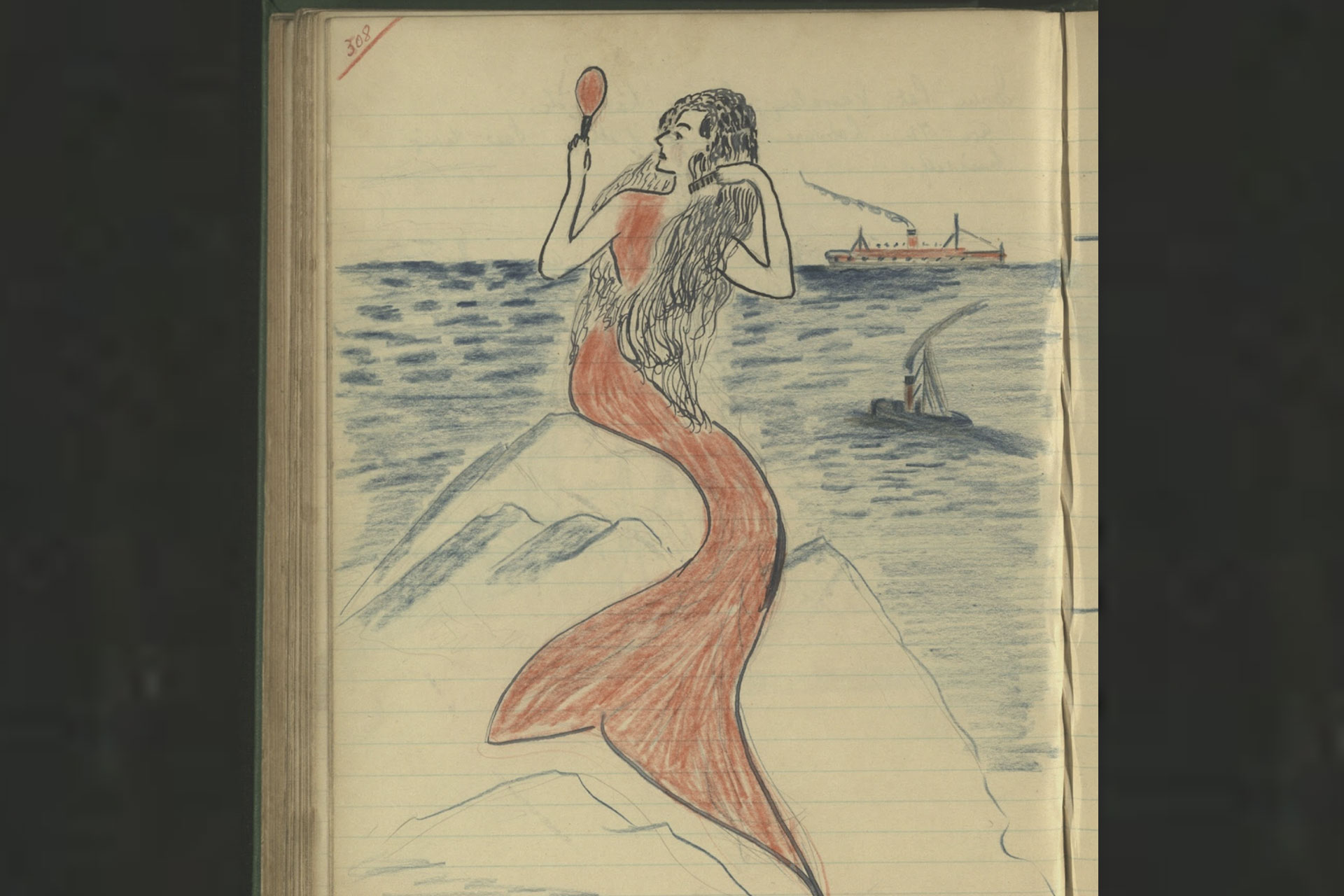The Mermaid
 Illustration of a Mermaid, Lahinch School, CBÉS 621: 308 [National Folklore Collection, UCD]
Illustration of a Mermaid, Lahinch School, CBÉS 621: 308 [National Folklore Collection, UCD]
A Mhaighdean Mhara
Is i mBéarla atá an buntéacs.
The Mermaid
In the olden days gone by, a mermaid used be seen by people at Rossbeigh Strand, Glanbehy, Co. Kerry. This lovely woman used be seen combing her beautiful golden hair, on every May morning. A man called Ó Séaghdha, he would make every endeavour to get the lovely woman for himself. On a certain May morning, Ó Séaghdha rode out on horse-back to where the mermaid was. The tide was out, and the beautiful woman was sitting on a stone combing her hair. When he was riding on the strand he noticed something glittering near the mermaid. He approached nearer and nearer, slowly, and found out that it was a cloak belonging to her. As he was quite close to her, he stooped down from the horse’s back and snatched the cloak from her. He then turned around the horse and made for the land as fast as it was in his horse’s legs, but the mermaid raised the tide with her power, and the waves began to roll in after him, but before Ó Séaghdha could reach dry-land, the tide swept half of the horse from under him. Still he got safely in with the cloak, and half of his horse.
While Ó Séaghdha was making for the land the mermaid was beside his side. He went home and the mermaid beside him. His mother asked him where did he get the beautiful woman – the bean dheas. He told her all that had happened, and sure she was delighted with her new visitor. Ó Séaghdha put the mermaid’s cloak between the straws and the thatch of the house, so as she could not get it anymore. He then married her but strange to say she never laughed or even smiled from that day out.
One day, a neighbouring woman called for a loan of a pot to boil potatoes for the family (It was the custom in those days to ask the loan of a pot from a neighbour, as pots were very scarce in those days, and people were not able to afford to buy one either). The mermaid was throwing her own potatoes out of the pot, on the table, so she offered some small amount of potatoes to the woman, in order that her children would not be ocrach [hungry] until her own were boiled. The woman refused her, and as she was going out the door with the pot, she fell and broke her leg. The mermaid then gave a big hearty laugh, and that was the first time she had laughed since her marriage to Ó Séaghdha. This happened on a Monday morning.
The mermaid gave birth to three children, and they were the three loveliest little children that were ever seen on land or on sea. Every morning a rón [seal] used to come near to the shore, calling, but the mermaid used to hear his calling, and she used to say;
“Dia lem’ chroí, seo Tadhg, é im’ lorgsa; agus marbhóidh sé mé.” [God be with me, here’s Tadhg, looking for me and he’ll kill me.]
The rón used to go back again to his ‘home’ when he could not see his ‘partner’ or ‘wife’. The people also used to wonder or could not know what was the matter with the rón every morning, but they thought that he was in trouble.
A few years later, Ó Séaghdha was clearing down the lochta [loft], and of course he had forgotten about the mermaid’s cloak. He was cleaning away at the dust, and he struck against the cloak and down it fell in the kitchen. The mermaid snatched it immediately, and on her it went. She went out the door like a ‘March hare’, and gave a laugh that could be heard over the whole baile [town]. He followed her as far as the strand, but she was gone out too far to sea. She laughed back at him several times but it was of no use for him. He had to return back home broken-hearted.
Any one of that name could never cross the ‘bar’ but would be drowned.* Three persons bearing the name Ó Séaghdha were drowned a short-times after her going away. Any member of the Ó Séaghdha family could never go fishing on the place called the ‘bar’, because they would get drowned. Even that belief still remains firmly in all the families bearing the name Ó Séaghdha.
*[The bar is a part of the sea that is very rough, and is near Rossbeigh Strand, Glanbehy, Co. Kerry. No boats ever cross at the bar, because the people still believe that great danger which is supposed to sit there – note written by collector]

